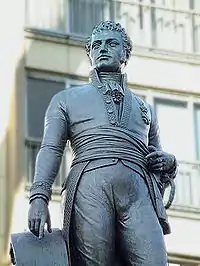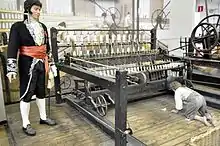Lieven Bauwens
Lieven Bauwens (14 June 1769, in Ghent – 17 March 1822, in Paris) was a Belgian entrepreneur and industrial spy who was sent to Great Britain at a young age and brought a spinning mule and skilled workers to the European continent.
Lieven Bauwens | |
|---|---|
 | |
| Born | 14 June 1769 |
| Died | March 17, 1822 (aged 52) |
| Resting place | Père Lachaise Cemetery |

Lieven Bauwens statue in Ghent

Lieven Bauwens and his Mule Jenny in the former MIAT. The mannequin was created after a painting by Félix Cogen in the Royal Museum of the Armed Forces and Military History in Brussels.
He started textile plants in Paris (1799) and Ghent (1800). In Ghent he was also mayor for one year. As a leading industrial, he was visited by Napoleon in 1810 and awarded the Legion d'Honneur.
In 1801, Bauwens smuggled a spinning mule and steam engine out of Great Britain to help set up the textile industry in Flanders.[1]: 22
The spinning mule that was brought to Ghent can still be visited, in the Industrial Museum .[2]
See also
References
- Gildea, Robert (2003). Barricades and Borders : Europe, 1800-1914 (3rd ed.). Oxford: Oxford University Press. ISBN 0-19-925300-5. OCLC 51274676.
{{cite book}}: CS1 maint: date and year (link) - "In de Kijker | Industrial Museum-". Museum of Industry. 15 October 2011. Retrieved 12 February 2012.
This article is issued from Wikipedia. The text is licensed under Creative Commons - Attribution - Sharealike. Additional terms may apply for the media files.